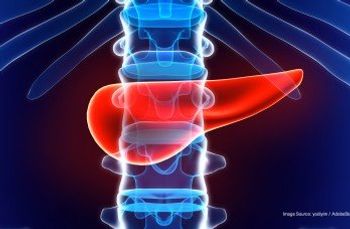
Ibrutinib/Venetoclax Combo Improves PFS in Relapsed/Refractory MCL
The addition of venetoclax to ibrutinib yields a favorable benefit/risk profile in patients with relapsed/refractory MCL, according to data from the phase 3 SYMPATICO trial.
Combining ibrutinib (Imbruvica) with venetoclax (Venclexta) resulted in significantly higher rates of progression-free survival (PFS) as well as complete responses (CRs) and time to next treatment (TTNT) compared with ibrutinib plus placebo in patients with relapsed/refractory mantle cell lymphoma (MCL), according to data from a primary analysis of the phase 3 SYMPATICO study (NCT03112174) presented during the
Data from the study demonstrated that the median investigator-assessed PFS with global censoring was 31.9 months in the ibrutinib plus venetoclax arm (n = 134) compared with 22.1 months in the ibrutinib plus placebo arm (n = 133; HR, 0.65; 95% CI, 0.47-0.88; log-rank P = .0052). Additionally, the median PFS per independent review committee (IRC) with global censoring (HR, 0.67; 95% CI, 0.49-0.91; log-rank P = .0108), by investigator assessment with US FDA censoring (HR, 0.60; 95% CI, 0.44-0.83; log-rank P = .0021), and by IRC assessment with US FDA censoring (HR, 0.63; 95% CI, 0.45-0.87; log-rank P = .0057), all favored the combination arm over placebo.
Moreover, the overall response rate (ORR) in the combination arm was 82%, with a 54% CR rate, vs 74%, with a 32% CR rate, in the placebo arm. The median duration of response (DOR) was 42.1 months vs 27.6 months, respectively.
“Ibrutinib is an oral BTK inhibitor that is approved in many countries for relapsed/refractory MCL,” Michael Wang, MD, a professor in the Department of Lymphoma/Myeloma, Division of Cancer Medicine, at The University of Texas MD Anderson Cancer Center in Houston, said during the presentation. “Venetoclax is an oral BCL2 inhibitor that’s also approved in multiple countries to treat chronic lymphocytic leukemia and untreated acute myeloid leukemia. The combination of these 2 agents leverages complementary modes of action and has demonstrated synergistic antitumor activity in preclinical models of MCL. Furthermore, in patients with relapsed/refractory MCL, promising clinical activity has also been observed with the combination of the 2 [agents] in early phase studies.”
SYMPATICO was a multinational, double-blind study that enrolled patients with relapsed/refractory MCL who received 1 to 5 prior therapies for MCL. Eligible patients were at least 18 years old, had an ECOG performance status of 2 or less, and received at least 1 prior anti-CD20-containing regimen or rituximab (Rituxan). Stratification occurred based on ECOG performance status, prior lines of therapy, and tumor lysis syndrome risk.
Patients were randomly assigned 1:1 to receive ibrutinib 560 mg once daily for 24 months in combination with venetoclax or placebo. Venetoclax was given via a 5-week ramp up to 400 mg once daily for 24 months. After 24 months, all patients then received single-agent ibrutinib 560 mg once daily until disease progression or unacceptable toxicity.
The primary end point was PFS by investigator assessment per Lugano criteria. Secondary end points included investigator-assessed CR rate, time to next treatment, overall survival (OS), and ORR by investigator assessment.
Additional findings revealed that OS was numerically improved in the combination arm compared with the placebo arm at this interim analysis. The median OS was 44.9 months vs 38.6 months, respectively (HR, 0.85; 95% CI, 0.62-1.19; log-rank P = .3465).
In terms of safety, most patients in the combination (n = 134) and placebo (n = 132) arms experienced grade 3 or higher adverse effects (AEs; 84% vs 76%, respectively) and serious AEs (60% vs 60%). AEs leading to discontinuation (31% vs 36%), dose reduction (36% vs 22%), and death (16% vs 14%) were reported in both arms, respectively. Tumor lysis syndrome by laboratory assessment occurred in 7 and 3 patients, respectively.
The most frequent any-grade AEs in the combination arm included diarrhea (65%), neutropenia (34%), nausea (31%), fatigue (29%), anemia (22%), pyrexia (21%), cough (20%), and muscle spasms (8%); these events occurred at rates of 34%, 14%, 17%, 27%, 12%, 20%, 27%, and 24%, in the placebo arm, respectively. The most common grade 3 or higher AEs in the investigational vs placebo arm consisted of neutropenia (31% vs 11%), pneumonia (13% vs 11%), thrombocytopenia (13% vs 8%), anemia (10% vs 3%), diarrhea (8% vs 2%), leukopenia (7% vs 0%), worsening of MCL without disease progression (7% vs 12%), atrial fibrillation (5% vs 5%), COVID-19 (5% vs 1%), and hypertension (4% vs 9%).
The median treatment duration in the combination arm was 22.2 months (range, 0.5-60.4). In the placebo arm, the median treatment duration was 17.7 months (range, 0.1-58.9).
“In conclusion, ibrutinib [plus] venetoclax achieved a statistically significant improvement in PFS compared with ibrutinib plus placebo,” Wang said. “This combination [displayed] robust benefit across all sensitivity analyses. CR rate and time to next therapy was significantly statistically improved. OS was numerically but not statistically significantly improved at this interim analysis. The addition of venetoclax to ibrutinib has a favorable benefit to risk ratio in patients with relapsed/refractory MCL. In my personal opinion, this combination in the countries where ibrutinib is indicated should be a new standard therapy for relapsed/refractory MCL.”
Reference
Wang M, Jurczak W, Trněný M, et al. Ibrutinib combined with venetoclax in patients with relapsed/refractory mantle cell lymphoma: primary analysis results from the randomized phase 3 SYMPATICO study. Blood. 2023;142(suppl 2):LBA2. doi:10.1182/blood-2023-191921
Newsletter
Stay up to date on recent advances in the multidisciplinary approach to cancer.












































